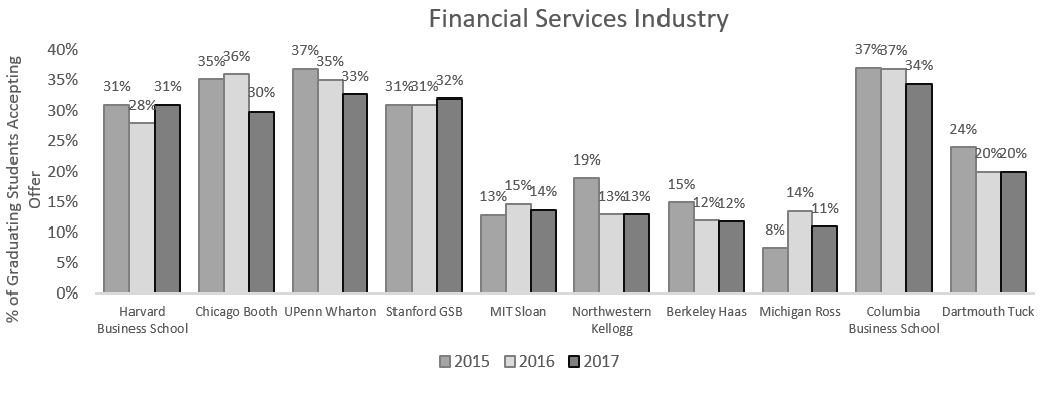Demand is high for recent MBA graduates. In 2017 in the U.S. and Canada, technology firms increased year-over-year MBA hiring by 22 percent and consulting and financial services firms increased hiring by 7 percent and 4 percent respectively. The same report (QS Top MBA Jobs & Salary Trends Report 2018) projects that overall MBA recruiting in the U.S. and Canada will continue to demonstrate robust growth in 2018 (7 percent) and marginal growth in 2019 (2 percent).
Technology: The growth in technology firms’ MBA hiring corresponds with reports that Amazon is hiring about 1,000 MBA graduates per year, almost double that of the next largest MBA employer, consulting firm McKinsey[i]. And the growth isn’t expected to slow in 2018. The QS Top MBA Salary Trends Report projects that recruiting in the U.S. and Canada by technology firms will continue growing in 2018 (15 percent) with more marginal growth predicted for 2019 (two percent).
In addition to Amazon, Microsoft and Google also recruit consistently within MBA programs, but with lower overall hiring. It is worthy of note that, among the Top 10 programs (US News and World Report), the largest percentage of 2017 graduates who accepted positions in the technology industry came from Berkeley Haas.
Consulting: Consulting firms recruit a large percentage of MBA graduates (approximately a quarter to a third of each class at Top 10 MBA Programs) and this is expected to continue. The QS Top MBA Salary Trends Report projects that recruiting in the U.S. and Canada by consulting firms will increase by 15 percent in 2018 with a slight dip to 7 percent in 2019.
McKinsey, the second largest employer of MBAs, is the top employer of MBA graduates at Northwestern Kellogg, Chicago Booth, and Columbia Business School. Following McKinsey in MBA recruiting are Bain and Company, The Boston Consulting Group, and Deloitte.
At Stanford, the percentage of graduates securing roles in consulting is lower but trending upwards.
Finance: Developments in technology, political uncertainty, and greater competition from technology and other firms, has negatively impacted MBA recruiting by financial services firms. Wharton, as well as Chicago Booth, and Columbia Business School have experienced recent employment dips in the sector. According to a 2017 MBA Employment Survey by Training the Street, students reported lower interest in working for Wall Street and expressed wanting to explore options with companies, such as boutique banks, that may offer a higher quality of life.[ii]
The Salary Trends Report projects another year of modest growth for the industry in 2018 (4 percent) with a slight decline predicted for 2019 (-1 percent).




